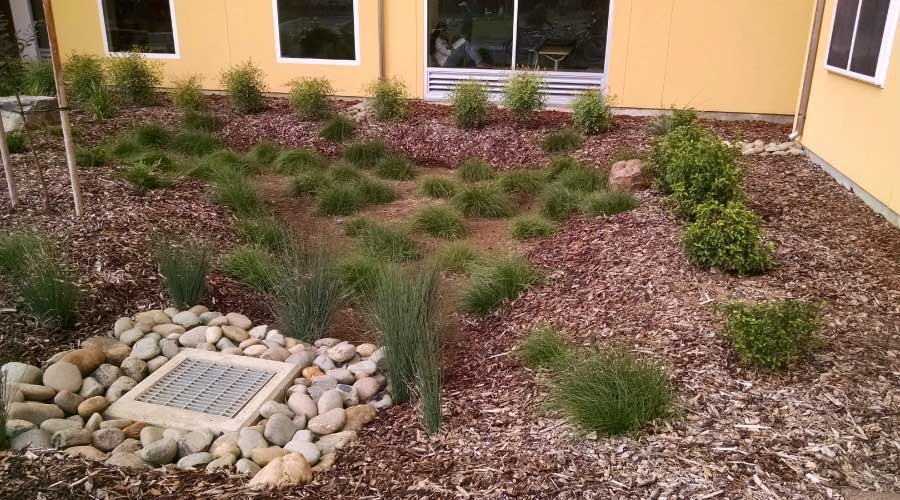Most Sustainability Departments Have Wide-Ranging Responsibilities, Small Staff
Most sustainability departments are small operations with huge purview. "Lots of CSOs, me included, tend to have few direct resources and a lean staff," Katz says. From a sustainability perspective, Katz is not only responsible for sustainable policy on campus — including waste, water, energy, greenhouse gases, procurement and operations — she also helps define how to incorporate sustainability into the curriculum, as well as turn the campus into a "living, learning laboratory" for students.
Matthews, who says her responsibilities include "anything that doesn't get picked up by the other business units," has one person working with her, and is trying to hire a second. But she says she actually enjoys the challenge of a small department. "I'm comfortable being lean and mean," she says. "It's an incredible freedom."
But how to draw boundaries? How to learn how to pick projects and areas of focus with the most impact? "Prioritizing is about doing the right things at the right location in the right order," says Probst. "The key is to find what resonates."
Schulz adds: "What we've found to be effective to get people's attention is using a very data-driven process. We use the tenets of quality management and look at how we can eliminate waste and be more efficient. And then, how we can make it all visible."
Schulz mentions AT&T's Energy Scorecard project as one example of a success. By giving each building in the company's portfolio a rating based on energy efficiency and what's happening at those buildings to continue to be efficient, and then making those results public, Schulz says the sustainability team was able to tap into employee competitiveness to get results. "Success propels success," he says.
One important aspect of success, say these experts, is recognizing failure — or at least understanding limitations.
"Admit things that can't be done," says Conley. "Show flaws as well as successes. This creates credibility." Thankfully, says Matthews, sustainability executives are generally an honest bunch. "We network a lot and exchange a lot of information," she says. "We'll talk about what's working and how to improve."
That also illustrates another characteristic of most sustainability executives: sustainability is well more than a career — it's a firmly held belief that is as much a part of their personal as professional lives. "The field of sustainability draws people who want to make an impact," says Katz.
Oftentimes, it's the infectious enthusiasm for their positions — the notion that they're not just doing a job, they're making a real difference — that wins these fans.
"In general, people want sustainability to win," says Matthews.
So You Want To Be A Sustainability Executive?
If you're thinking of making sustainability a career, seven experts offer tips on the skills that make for a successful sustainability executive:
"An MBA is useful, but not necessary. Knowledge of finance is critical, but so is the ability to take a holistic approach." – Bill Conley, chief sustainability officer, CFM2
"Think about if you thrive in a generalist environment. You have to be able to work on 500 projects at once without much supervision. It's very similar to being an entrepreneur — you're managing all aspects of the department, the website, accounting, sales, customer service, marketing." — Nurit Katz, chief sustainability officer, UCLA
"You have to be willing to be tenacious, stick your neck out and stick to your principles. But also remember, people don't like to be preached to." — Charlotte Matthews, vice president of sustainability, The Related Companies
Look for a gap that needs to be filled. Recognize opportunities by understanding not only where advancement is possible, but also what you can do to best help the organization be more efficient. "Also, make friends with the finance folks." — John Schulz, director of sustainable operations, AT&T
"You need to have good communication skills. Be a good logical thinker." — Dan Probst, chairman of energy and sustainability, Jones Lang LaSalle
Leadership and the ability to build bridges are the most critical skills. But you have to be willing to engage employees, as well. Remember, some of the best suggestions for efficiencies come from employees. — Ellen Weinreb, founder, The Weinreb Group
"The most important skill — come up with original ideas. You have to be creative. Have a high energy level." — Gary Saulson, executive vice president, director of corporate real estate, PNC Bank
If a sustainability executive is not in the plans for your organization, Katz offers one last bit of encouragement: "You can make an impact in this field from any position. You don't need to be a CSO."
– Greg Zimmerman, executive editor |
Related Topics:














